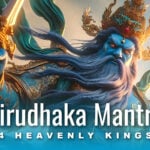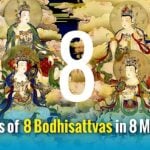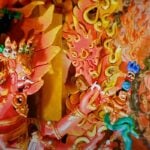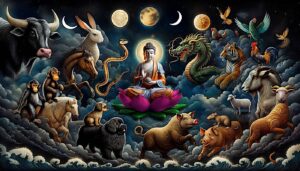Why Dhamma (Dharma) is the most important of the Three Jewels: “The Dhamma is our arbitrator” — Ananada in the Gopaka Moggallana Sutta
One of the most unique and captivating of Pali Suttas actually records events after Buddha passed away. Why, then, if Buddha is not teaching, is this interesting? Aside from the fascinating historical perspective, it carries a vey profound and important message:
The Dhamma is our arbitrator.
Often, we hear modern-day teachers say, “We take refuge in the Three Jewels — Buddha, Dharma and Sangha — but the most important of these is Dharma.”
Iconic of this important concept is a monastery painting in Laos depicting Sattapitaka — years later — teaching Sutra at the First Buddhist Council.
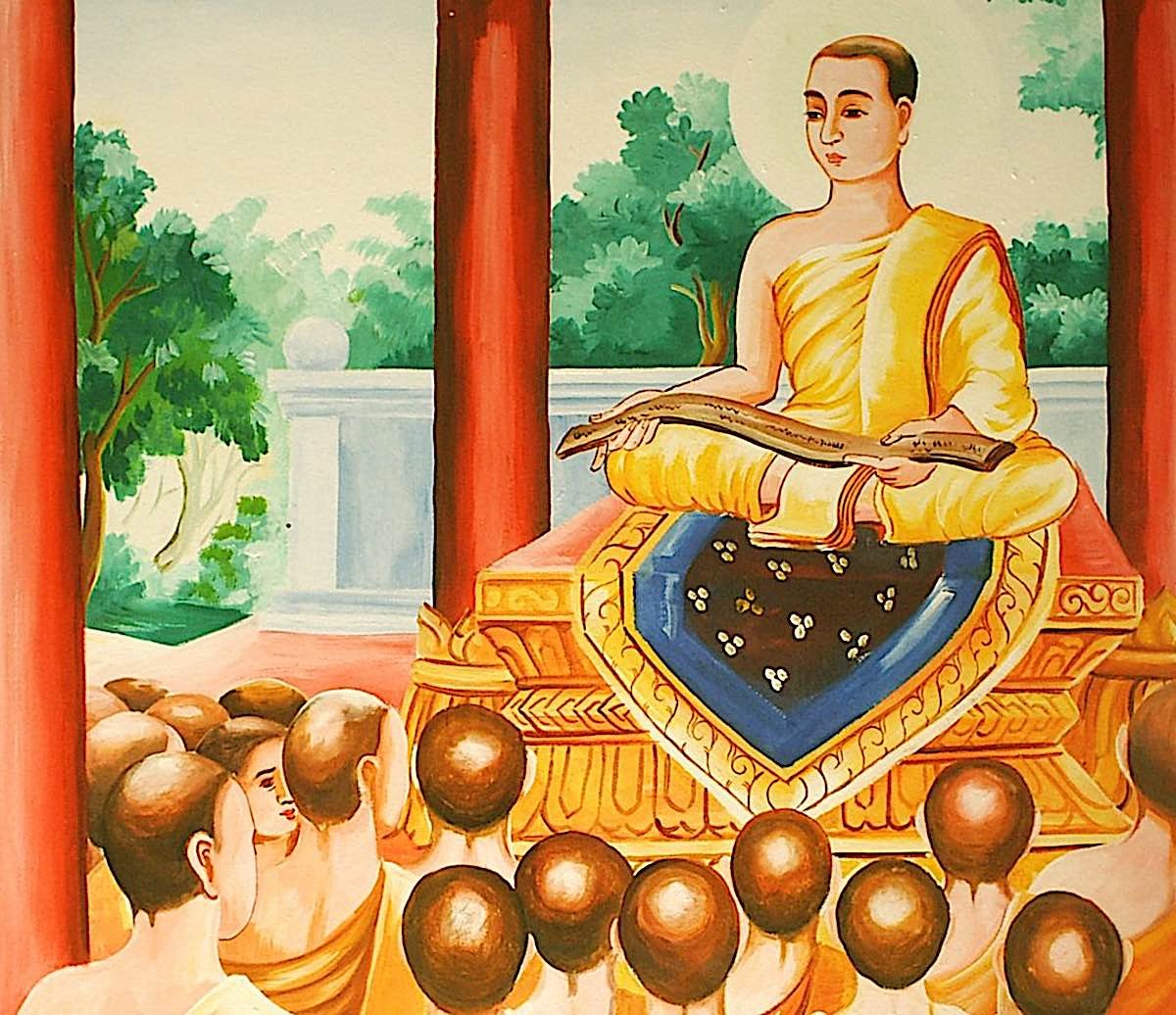
The Dhamma — the Dharma and the Suttas or Sutras — are the “concord” that holds together the Buddhist Sangha. Buddha was teacher, but what is vital to the profound power of Dharma is the “teachings.” The same holds true of the non-monastic student of Buddhism. The Dharma (Dhamma) is our true guide.
- Did you know Buddha Weekly has an entire feature section dedicated to Sutta or Sutra? Visit it here>>
After Buddha Passes Away
One of the sources of this meaningful teaching is actually the Gopaka Moggallana Sutta, where Ananda is patiently explaining to a Brahmin why Buddhism will have supreme relevance long after the precious Buddha has “passed away.” In previous Suttas (Sutras) we saw how agonized the monks — and especially Ananda — are when confronted with Buddha’s paranirvana. Yet, here is Ananada explaining to a guardsman and an Brahmin why the Dharma (Dhamma) is the most important thing — in a Sutta that is recorded after the Buddha passed away.
The Brahmin is asking tough questions, about the validity of the Buddhist Sangha after Buddha departs the world samsara:
“Then is there any one monk authorized by the Sangha and appointed by a large body of elder monks [with the words], ‘He will be our arbitrator after the Blessed One is gone,’ to whom you now turn?”
“No, Brahman. There isn’t any one monk authorized by the Sangha and appointed by a large body of elder monks [with the words] ‘He will be our arbitrator after the Blessed One is gone,’ to whom we now turn.”
“Being thus without an arbitrator, Master Ánanda, what is the reason for your concord?”
“It’s not the case, Brahman, that we’re without an arbitrator. We have an arbitrator. The Dhamma is our arbitrator.”
Another variation on this theme is the metaphorical: Buddha is the Doctor, Dharma is the Medicine, Sangha is the Support. Clearly, when we are sick, the medicine matters the most. Dharma is our medicine.
There can be no doubt that to have a teacher such as Gautama Buddha would be incomparable, yet there can also be no doubt from this dissertation, that even more excellent — at least from the point of view of students who cannot learn directly from the Buddha — is the Dharma itself. The teachings. Ananda finishes this sutta with:
“Didn’t I just tell you, Brahman? There isn’t any one monk endowed in each and every way with the qualities with which the Blessed One — worthy and rightly self-awakened — was endowed. For the Blessed One was the arouser of the un- arisen path, the begetter of the un-begotten path, the expounder of the un-expounded path, the knower of the path, the expert with regard to the path, adept at the path. And now his disciples follow the path and become endowed with it after him.”
Thanissaro Bhikku’s Translator’s Note:
“This discourse presents a picture of life in the early Buddhist community shortly after the Buddha’s passing away. On the one hand, it shows the relationship between the monastic community and the political powers that be: the monks are polite and courteous to political functionaries, but the existence of this discourse shows that they had no qualms about depicting those functionaries as a little dense. On the other hand, it shows that early Buddhist practice had no room for many practices that developed in later Buddhist traditions, such as appointed lineage holders, elected ecclesiastical heads, or the use of mental defilements as a basis for concentration practice.”
Gopaka Moggallana Sutta
Moggallana the Guardsman
MN 108
Translated from the Pali by Thanissaro Bhikkhu
I have heard that on one occasion Ven. Ánanda was staying near Rajagaha in the Bamboo Grove, the Squirrels’ Sanctuary, not long after the Blessed One’s total Unbinding.
Now at that time King Ajatasattu Vedehiputta of Magadha, suspicious of King Pajjota, was having Rajagaha fortified.
Then in the early morning, Ven. Ánanda, having put on his robes and carrying his bowl and outer robe, went into Rajagaha for alms. The thought occurred to him, “It’s too early to go for alms in Rajagaha. What if I were to go to the Brahman Moggallana the Guardsman at his construction site?” So he went to Moggallana the Guardsman at his construction site. Moggallana the Guardsman saw him coming from afar, and on seeing him said to him, “Come, Master Ánanda. Welcome, Master Ánanda. It has been a long time since Master Ánanda has found the time to come here. Sit down, Master Ánanda. Here is a seat made ready for you.”
So Ven. Ánanda sat down on the seat made ready. Moggallana the Guardsman, taking a lower seat, sat to one side.
As he was sitting there, he said to Ven. Ánanda: “Master Ánanda, is there any one monk endowed in each and every way with the qualities with which Master Gotama — worthy and rightly self-awakened — was endowed?”
“No, Brahman, there isn’t any one monk endowed in each and every way with the qualities with which the Blessed One —
worthy and rightly self-awakened — was endowed. For the Blessed One was the arouser of the un-arisen path, the begetter of the un-begotten path, the expounder of the un- expounded path, the knower of the path, the expert with regard to the path, adept at the path. And now his disciples follow the path and become endowed with it after him.”
And then Ven. Ánanda’s discussion with Moggallana the Guardsman was interrupted in mid-course, for the Brahman Vassakara, the Magadhan administrator, on an inspection tour of the construction sites in Rajagaha, went to Ven. Ánanda at Moggallana the Guardsman’s construction site. On arrival, he exchanged courteous greetings with Ven. Ánanda. After an exchange of friendly greetings and courtesies, he sat to one side. As he was sitting there, he said to Ven. Ánanda, “Just now, for what discussion were you sitting together when you were interrupted in mid-course?”
“Just now, Brahman, Moggallana the Guardsman said to me, ‘Master Ánanda, is there any one monk endowed in each and every way with the qualities with which Master Gotama — worthy and rightly self-awakened — was endowed?’ And when this was said, I said to him, ‘No, Brahman, there isn’t any one monk endowed in each and every way with the qualities with which the Blessed One — worthy and rightly self-awakened — was endowed. For the Blessed One was the arouser of the un- arisen path, the begetter of the un-begotten path, the expounder of the un-expounded path, the knower of the path, the expert with regard to the path, adept at the path. And now his disciples follow the path and become endowed with it after him.’ This was my discussion with the Brahman Moggallana the Guardsman that was interrupted in mid-course when you arrived.”
“Master Ánanda, is there any one monk appointed by Master Gotama [with the words], ‘He will be your arbitrator after I am gone,’ to whom you now turn?”
“No, Brahman. There isn’t any one monk appointed by the Blessed One — the one who knows, the one who sees, worthy and rightly self-awakened — [with the words] ‘He will be your arbitrator after I am gone,’ to whom we now turn.”
“Then is there any one monk authorized by the Sangha and appointed by a large body of elder monks [with the words], ‘He will be our arbitrator after the Blessed One is gone,’ to whom you now turn?”
“No, Brahman. There isn’t any one monk authorized by the Sangha and appointed by a large body of elder monks [with the words] ‘He will be our arbitrator after the Blessed One is gone,’ to whom we now turn.”
“Being thus without an arbitrator, Master Ánanda, what is the reason for your concord?”
“It’s not the case, Brahman, that we’re without an arbitrator. We have an arbitrator. The Dhamma is our arbitrator.”
“When asked, ‘Master Ánanda, is there any one monk appointed by Master Gotama [with the words], “He will be your arbitrator after I am gone,” to whom you now turn?’ you said, ‘No, Brahman. There isn’t any one monk appointed by the Blessed One… to whom we now turn.’
“When asked, ‘Then is there any one monk authorized by the Sangha… to whom you now turn?’ you said, ‘No, Brahman. There isn’t any one monk authorized by the Sangha… to whom we now turn.’
“When asked, ‘Being thus without an arbitrator, Master Ánanda, what is the reason for your concord?’ you said, ‘It’s not the case, Brahman, that we’re without an arbitrator. We have an arbitrator. The Dhamma is our arbitrator.’ Now how is the meaning of what you have said to be understood?”
“Brahman, there is a training rule laid down by the Blessed One — the one who knows, the one who sees, worthy and rightly self-awakened — a Patimokkha that has been codified. On the uposatha day, all of us who live dependent on a single township gather together in one place. Having gathered together, we invite the one to whom it falls [to recite the Patimokkha]. If, while he is reciting, a monk remembers an offense or transgression, we deal with him in accordance with the Dhamma, in accordance with what has been instructed. We’re not the ones who deal with that venerable one. Rather, the Dhamma is what deals with us.”
“Is there, Master Ánanda, any one monk you now honor, respect, revere, and venerate, on whom — honoring and respecting — you live in dependence?”
“Yes, Brahman, there is a monk we now honor, respect, revere, and venerate, on whom — honoring and respecting — we live in dependence.”
“When asked, ‘Master Ánanda, is there any one monk appointed by Master Gotama [with the words], “He will be your arbitrator after I am gone,” to whom you now turn?’ you said, ‘No, Brahman. There isn’t any one monk appointed by the Blessed One… to whom we now turn.’
“When asked, ‘Then is there any one monk authorized by the Sangha… to whom you now turn?’ you said, ‘No, Brahman. There isn’t any one monk authorized by the Sangha… to whom we now turn.’
“When asked, ‘Is there, Master Ánanda, any one monk you now honor, respect, revere, and venerate, on whom — honoring and respecting — you live in dependence?’ you said, ‘Yes, Brahman, there is a monk we now honor, respect, revere, and venerate, on whom — honoring and respecting — we live in dependence.’ Now how is the meaning of what you have said to be understood?”
10 Inspiring Qualities Expounded by the Blessed One
“Brahman, there are ten inspiring qualities expounded by the Blessed One — the one who knows, the one who sees, worthy and rightly self-awakened. In whoever among us those ten qualities are found, we now honor, respect, revere, and venerate him; honoring and respecting him, we live in dependence on him. Which ten?
[1] “There is the case where a monk is virtuous. He dwells restrained in accordance with the Patimokkha, consummate in his behavior and sphere of activity. He trains himself, having undertaken the training rules, seeing danger in the slightest faults.
[2] “He has heard much, has retained what he has heard, has stored what he has heard. Whatever teachings are admirable in the beginning, admirable in the middle, admirable in the end, that — in their meaning and expression — proclaim the holy life entirely perfect and pure: those he has listened to often, retained, discussed, accumulated, examined with his mind, and well-penetrated in terms of his views.
[3] “He is content with robes, alms food, lodgings, and medicinal requisites for curing the sick.
[4] “He attains — whenever he wants, without strain, without difficulty — the four jhanas that are heightened mental states, pleasant abiding’s in the here-and-now.
[5] “He experiences manifold supra-normal powers. Having been one he becomes many; having been many he becomes one. He appears. He vanishes. He goes unimpeded through walls, ramparts, and mountains as if through space. He dives in and out of the earth as if it were water. He walks on water without sinking as if it were dry land. Sitting cross-legged he flies through the air like a winged bird. With his hand he touches and strokes even the sun and moon, so mighty and powerful. He exercises influence with his body even as far as the Brahma worlds.
[6] “He hears — by means of the divine ear-element, purified and surpassing the human — both kinds of sounds: divine and human, whether near or far.
[7] “He knows the awareness of other beings, other individuals, having encompassed it with his own awareness. He discerns a mind with passion as a mind with passion, and a mind without passion as a mind without passion. He discerns a mind with aversion as a mind with aversion, and a mind without aversion as a mind without aversion. He discerns a mind with delusion as a mind with delusion, and a mind without delusion as a mind without delusion. He discerns a restricted mind as a restricted mind, and a scattered mind as a scattered mind. He discerns an enlarged mind as an enlarged mind, and an un-enlarged mind as an un-enlarged mind. He discerns an excelled mind [one that is not at the most excellent level] as an excelled mind, and an unexcelled mind as an unexcelled mind. He discerns a concentrated mind as a concentrated mind, and an un- concentrated mind as an un-concentrated mind. He discerns a released mind as a released mind, and an unreleased mind as an unreleased mind.
[8] “He recollects his manifold past lives (lit: previous homes), i.e., one birth, two births, three births, four, five, ten, twenty, thirty, forty, fifty, one hundred, one thousand, one hundred thousand, many aeons of cosmic contraction, many aeons of cosmic expansion, many aeons of cosmic contraction and expansion, [recollecting], ‘There I had such a name, belonged to such a clan, had such an appearance. Such was my food, such my experience of pleasure and pain, such the end of my life. Passing away from that state, I re-arose there. There too I had such a name, belonged to such a clan, had such an appearance. Such was my food, such my experience of pleasure and pain, such the end of my life. Passing away from that state, I re-arose here.’ Thus he remembers his manifold past lives in their modes and details.
[9] “He sees — by means of the divine eye, purified and surpassing the human — beings passing away and re- appearing, and he discerns how they are inferior and superior, beautiful and ugly, fortunate and unfortunate in accordance with their kamma: ‘These beings — who were endowed with bad conduct of body, speech, and mind, who reviled the noble ones, held wrong views and undertook actions under the influence of wrong views — with the break-up of the body, after death, have re-appeared in the plane of deprivation, the bad destination, the lower realms, in hell. But these beings — who were endowed with good conduct of body, speech, and mind, who did not revile the noble ones, who held right views and undertook actions under the influence of right views — with the break-up of the body, after death, have re-appeared in the good destinations, in the heavenly world.’ Thus — by means of the divine eye, purified and surpassing the human — he sees beings passing away and re-appearing, and he discerns how they are inferior and superior, beautiful and ugly, fortunate and unfortunate in accordance with their kamma.
[10] “Through the ending of the mental fermentations, he remains in the fermentation-free release of awareness and release of discernment, having known and made them manifest for himself right in the here and now.
“These, Brahman, are the ten inspiring qualities expounded by the Blessed One — the one who knows, the one who sees, worthy and rightly self-awakened. In whoever among us these ten qualities are found, we now honor, respect, revere, and venerate him; honoring and respecting him, we live in dependence on him.”
When this was said, the Brahman Vassakara, the Magadhan administrator, turned to General Upananda and said, “What do you think, general? Do these venerable ones honor what should be honored, respect what should be respected, revere what should be revered, venerate what should be venerated? Of course they honor what should be honored, respect what should be respected, revere what should be revered, venerate what should be venerated. For if they did not honor, respect, revere, or venerate a person like this, then what sort of person would they honor, respect, revere, and venerate; on what sort of person, honor and respecting, would they live in dependence?”
Then the Brahman Vassakara, the Magadhan administrator, said to Ven. Ánanda, “But where are you staying now, Master Ánanda?”
“I am now staying at the Bamboo Grove, Brahman.”
“I trust, Master Ánanda, that the Bamboo Grove is delightful, quiet, free of noise, with an air of isolation, remote from human beings, and appropriate for retreat.”
“Certainly, Brahman, the Bamboo Grove is delightful, quiet, free of noise, with an air of isolation, remote from human beings, and appropriate for retreat because of guardians and protectors like yourself.”
“Certainly, Master Ánanda, the Bamboo Grove is delightful, quiet, free of noise, with an air of isolation, remote from human beings, and appropriate for retreat because of venerable ones who are endowed with mental absorption (jhana), who make mental absorption their habit. You venerable ones are both endowed with mental absorption and make mental absorption your habit.
“Once, Ven. Ánanda, Master Gotama was staying near Vesali in the Peaked Roofed Pavilion in the Great Wood. I went to him at the Peaked Roofed Pavilion in the Great Wood, and there he spoke in a variety of ways on mental absorption. Master Gotama was both endowed with mental absorption and made mental absorption his habit. In fact, he praised mental absorption of every sort.”
“It wasn’t the case, Brahman, that the Blessed One praised mental absorption of every sort, nor did he criticize mental absorption of every sort. And what sort of mental absorption did he not praise? There is the case where a certain person dwells with his awareness overcome by sensual passion, seized with sensual passion. He does not discern the escape, as it actually is present, from sensual passion once it has arisen. Making that sensual passion the focal point, he absorbs himself with it, besorbs, resorbs, and supersorbs himself with it.
“He dwells with his awareness overcome by ill will…
“He dwells with his awareness overcome by sloth and drowsiness…
“He dwells with his awareness overcome by restlessness and anxiety…
“He dwells with his awareness overcome by uncertainty, seized with uncertainty. He does not discern the escape, as it actually is present, from uncertainty once it has arisen. Making that uncertainty the focal point, he absorbs himself with it, besorbs, resorbs, and supersorbs himself with it. This is the sort of mental absorption that the Blessed One did not praise.
“And what sort of mental absorption did he praise? There is the case where a monk — quite withdrawn from sensual pleasures, withdrawn from unskillful (mental) qualities — enters and remains in the first jhana: rapture and pleasure born from withdrawal, accompanied by directed thought and evaluation. With the stilling of directed thought and evaluation, he enters and remains in the second jhana: rapture and pleasure born of concentration, unification of awareness free from directed thought and evaluation — internal assurance. With the fading of rapture, he remains in equanimity, mindful and fully aware, and physically sensitive of pleasure. He enters and remains in the third jhana, of which the Noble Ones declare, ‘Equanimous and mindful, he has a pleasurable abiding.’ With the abandoning of pleasure and pain — as with the earlier disappearance of
elation and distress — he enters and remains in the fourth jhana: purity of equanimity and mindfulness, neither pleasure nor pain. This is the sort of mental absorption that the Blessed One praised.
“It would seem, Ven. Ánanda, that Master Gotama criticized the mental absorption that deserves criticism, and praised that which deserves praise.
“Well, now, Master Ánanda, I must be going. Many are my duties, many the things I must do.”
“Then do, Brahman, what you think it is now time to do.”
So the Brahman Vassakara, the Magadhan administrator, delighting and rejoicing in what Ven. Ánanda had said, got up from his seat and left.
Then, not long after he had left, Moggallana the Guardsman said to Ven. Ánanda, “Master Ánanda, you still haven’t answered what I asked you.”
“Didn’t I just tell you, Brahman? There isn’t any one monk endowed in each and every way with the qualities with which the Blessed One — worthy and rightly self-awakened — was endowed. For the Blessed One was the arouser of the un- arisen path, the begetter of the un-begotten path, the expounder of the un-expounded path, the knower of the path, the expert with regard to the path, adept at the path. And now his disciples follow the path and become endowed with it after him.”
More articles by this author
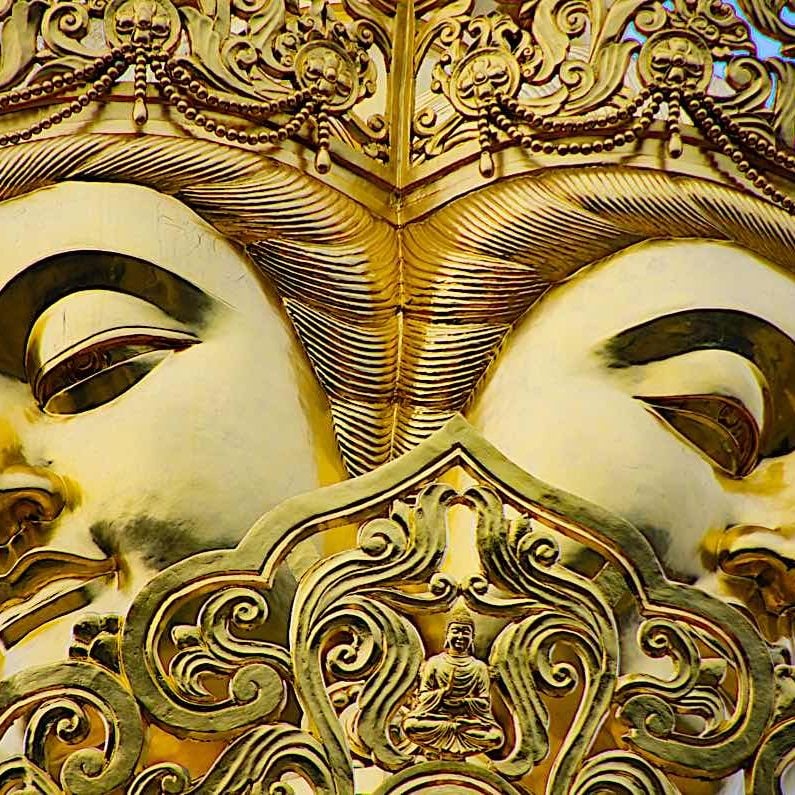
Samantabhadra’s The King of Prayers is the ultimate Buddhist practice how-to and itself a complete practice
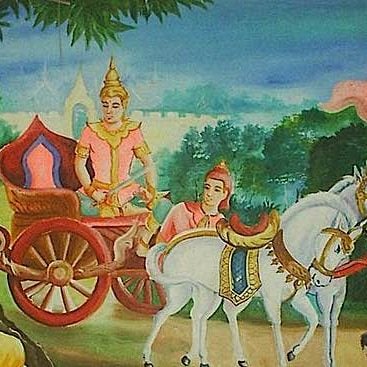
The Five Strengths and Powers or pañcabalā in Buddhism — the qualities conducive to Enlightenment: faith, energy, mindfulness, concentration and wisdom

Tara’s Great Dharani Supreme of all Mantras –with Music version– and the Sutra of Tara Who Protects from the Eight Fears: in Tara’s Own Words
Search
Latest Features
Please support the "Spread the Dharma" mission as one of our heroic Dharma Supporting Members, or with a one-time donation.
Please Help Support the “Spread the Dharma” Mission!

Be a part of the noble mission as a supporting member or a patron, or a volunteer contributor of content.
The power of Dharma to help sentient beings, in part, lies in ensuring access to Buddha’s precious Dharma — the mission of Buddha Weekly. We can’t do it without you!
A non-profit association since 2007, Buddha Weekly published many feature articles, videos, and, podcasts. Please consider supporting the mission to preserve and “Spread the Dharma." Your support as either a patron or a supporting member helps defray the high costs of producing quality Dharma content. Thank you! Learn more here, or become one of our super karma heroes on Patreon.
Lee Kane
Author | Buddha Weekly
Lee Kane is the editor of Buddha Weekly, since 2007. His main focuses as a writer are mindfulness techniques, meditation, Dharma and Sutra commentaries, Buddhist practices, international perspectives and traditions, Vajrayana, Mahayana, Zen. He also covers various events.
Lee also contributes as a writer to various other online magazines and blogs.




